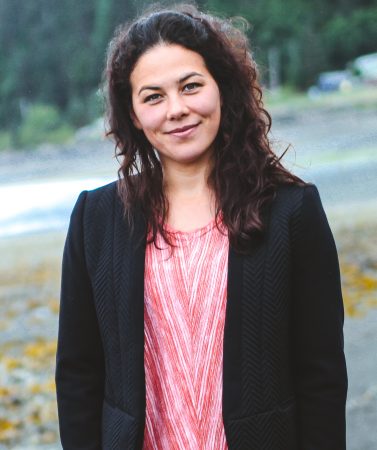Severn Cullis-Suzuki
About
Severn holds a B.Sc. in Evolutionary Biology from Yale University (’02), and an M.Sc. in Ethnoecology from the University of Victoria (’07) where she studied with Dr. Nancy Turner and Clan Chief Kwakxistala Adam Dick of the Dzawadenukw Nation (Kingcome Inlet, BC). Currently, she is a PhD candidate studying Haida language revitalization in the Haida community of Skidegate, where she has lived for the past 13 years with her husband, Judson Brown of the Ts’aahl Eagle clan. For her doctoral research, Severn is honoured to work with Dr. Patricia Shaw (Supervisor), and is collaborating with her family members (her mother-in-law Diane Brown, a fluent Haida speaker, her husband and their two children) in an intensive, intergenerational language revitalization project.
Severn is activist in her academic pursuits – she believes in and works toward real collaboration between academic institutions and communities, and leverages funding and tools to support Haida language revitalization on Haida Gwaii. She is passionate about higher education and Indigenous languages – she was a founding member of the Haida Gwaii Higher Education Society (haidagwaiisemester.com), and is the founding chair of the Haida Gwaii Mentor Apprentice Program Committee, a language revitalization program which supports Haida-fluent elders mentoring language learners.
Severn is an Action Canada Fellow (‘04-’05), a Vanier Scholar (2016-2019), and Public Scholar 2017-19). Severn was a Board member of the David Suzuki Foundation for 14 years, and currently sits on the Council for Earth Charter International (earthcharter.org). Severn lives in the village of HlGaagilda (Skidegate) with her husband and their two sons.
Research
Keywords – Indigenous language revitalization; linguistic anthropology; Pacific Northwest; Haida language & culture; Indigenous resilience & resurgence
In the Pacific Northwest, the Haida language is a critically endangered Indigenous language isolate, with approximately 30 first-language speakers remaining, all in the eldest generation. In the Haida communities of Old Massett, Skidegate, Hydaburg and Ketchikan, and in the Haida diaspora (including Vancouver and Juneau), younger generations are working to learn Haida as a second language (L2). Some families are bringing the language into their homes, despite a lack of fluency in the parent generation.
The focus of this Ph.D. dissertation is a one year autoethnographic study of a multigenerational Xaayda kil (Skidegate dialect) language transmission and acquisition effort within the researcher’s family in the Skidegate, an English-speaking Haida village. The family includes a grandmother (a first language (L1) fluent speaker of Xaayda kil), two parents (Haida father and non-Haida mother and researcher, both adult Haida L2 learners), and their two children (English-speaking children who have had significant Xaayda kil exposure since birth). The goal of this research is to create, document and evaluate an intensive language program for a family based on and evaluated by Haida cultural values and teachings, Second Language Acquisition (SLA) principles, and established Indigenous Language Revitalization (LR) strategies. To guide and contextualize this family case study, interviews with fluent L1 speakers will be undertaken to document L1 perspectives on current Haida LR efforts.
Publications
Cullis-Suzuki, S. (2019). Introduction. In T. Cottier, S. Lalani, & C. Siziba (Eds.), Intergenerational Equity: Environmental and Cultural Concerns (pp. 1–10). Leiden, Boston: Brill Nijhoff.
Cullis-Suzuki, S., Wyllie-Echeverria, S., Dick, K. A., Sewid-Smith, M. D., Recalma-Clutesi, O. K., & Turner, N. J. (2015). Tending the meadows of the sea: Traditional Kwakwaka’wakw harvesting of Ts’áts’ayem (Zostera marina L.; Zosteraceae). Aquatic Botany, 127, 26–34.
Cullis-Suzuki, S., Frederickson, K., Kayssi, A., McKenzie, C., & Cohen, D. A. (Eds.). (2007). Notes from Canada’s Young Activists: A Generation Stands up for Change. Vancouver: Greystone Books.
Awards
Public Scholar Initiative
Vanier Scholarship
SSHRC Scholarship
UBC Affiliated Scholarships
Additional Description
Linguistic Anthropology
